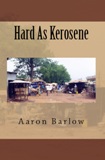Talking to Aaron Barlow (Togo 1988-90) Author of Hard as Kerosene
Here is a conversation I recently had with Aaron Barlow, author of Hard as Kerosene published by Peace Corps writers. — JC
•
Aaron, where were you a PCV?
In Togo from 1988 to 1990.
.
Where are you from in the States?
Though I was born in North Carolina, I grew up primarily in the Midwest, with stops back South and in the Northeast. I attended Beloit College in Wisconsin for my undergraduate degree and the University of Iowa for my MA and PhD.
.
Then you joined the Peace Corps?
No. I had spent two years in Burkina Faso as a Senior Fulbright Lecturer and had met many PCVs and admired them all. From them, I learned that there is much more to African life than can be found in the cities. I joined so that I could live in a village and discover a part of Africa I did not know.
.
Is there some story from you Peace Corps tour that has stayed with you all these years?
 The most dramatic incident, one I recount in the essay “Elephant Morning” that is included in the book of essays by RPCVs who served in Africa that I edited called One Hand Does Not Catch a Buffalo and that I fictionalize in Hard as Kerosene, was a chase by an elephant that left me at the elephant’s mercy. I had fallen, but the elephant had stopped before it was on top of me. After looking me over, it turned slightly away and I got up again and ran. It then picked up each item I’d abandoned there on the ground, tasted it, and dropped it. It then grabbed my camera bag by the strap and twirled it around its head before letting it fly. After that, it simply walked away into the forest.
The most dramatic incident, one I recount in the essay “Elephant Morning” that is included in the book of essays by RPCVs who served in Africa that I edited called One Hand Does Not Catch a Buffalo and that I fictionalize in Hard as Kerosene, was a chase by an elephant that left me at the elephant’s mercy. I had fallen, but the elephant had stopped before it was on top of me. After looking me over, it turned slightly away and I got up again and ran. It then picked up each item I’d abandoned there on the ground, tasted it, and dropped it. It then grabbed my camera bag by the strap and twirled it around its head before letting it fly. After that, it simply walked away into the forest.
.
Okay, what about you novel Hard As Kerosene. When did you decide to write it, and why?
I really wrote the book for me, so that the flavor of my experiences in West Africa in the 1980s would not be lost as my memory faded.
.
Most RPCVs are writing memoirs . . . why a novel?
I wanted to present a story without having to justify my own good sense (or, more to the point, lack of it). There are a lot of things in the novel that I did not want to explain but to simply present. Alcoholism, for example, is not something I wanted to explore simply from a personal point of view (there is too much of that in extant memoirs), but it is a danger for expatriates of all sorts (not just PCVs) and is central to the story I wanted to tell. Also, I wanted to incorporate into the book things like the death of Jennifer Rubin in Togo in 1984, something that I learned of before ever going to Africa (it was a big story, at the time). It was only years after the fact that I really got to know well one of the people who had been posted near her, John Elmer, an animal-traction Volunteer who was, in 1988, my own animal-traction trainer. It was from him that I learned more about Rubin’s death. There are other examples but, simply put, I wanted, as you say, “range” and “freedom.”
.
Today, we don’t have many RPCVs who will remember that tragic death of Jennifer Rubin. Why was it so significant?
Rubin had been featured in a segment of the CBS news show “On the Road with Charles Kuralt” just months before she was beaten to death in her home not far from Lama-Kara in mid-country Togo. Unlike the fictionalized version where it is PCVs who find her, it was actually the country director. The story made the front page of The New York Times a couple of months before my first visit to West Africa.
.
How would you describe your novel?
Hard as Kerosene is a tale of struggle and failure, but with refusal to let failure turn into defeat. It is set against a small war between Mali and Burkina Faso in December, 1985, but it also follows the main character through the four years leading up to the war.
.
By the way, why the title, Hard as Kerosene?
Wow, that’s a complicated one! A friend of mine, originally from Ghana, says Americans hardly know what kerosene is, anymore, but added that he finds it appropriate to the setting of the book. However, it actually comes from a song by Townes Van Zandt called “Pancho and Lefty.” I listened to Van Zandt a great deal in Africa and that song was one of my favorites. It begins,
Livin’ on the road, my friend/
Was gonna keep you free and clean;
Now you wear your skin like iron,
Your breath’s as hard as kerosene.
The song tells the tale of a man who leaves home for hardship and adventure only to return, defeated. I don’t want to believe that my protagonist, Paul, returns to the States quite that way, but he hits bottom and his return home is acknowledgement of the struggle he now faces — but it is a struggle that can have a positive outcome. Late in the song are these lines:
The poets tell how Pancho fell
And Lefty’s livin’ in a cheap hotel;
The desert’s quiet and Cleveland cold
And so the story ends, we’re told.
No story is ever really over, though, and I have hopes for both Lefty and Paul. There are actually many more connections between book and song, but I think that’s probably quite enough for now!
.
I know you have read a lot of Peace Corps writers. What book — besides your own — would you recommend to others, and why?
The series of four books of essays that Jane Albritton created for the 50th anniversary of Peace Corps is what I would recommend most heartily. I edited the Africa volume, so have something of a vested interest, but I do believe that, taken together, the series gives the best and most honest look at Peace Corps over its history that can be found anywhere. They are: One Hand Does Not Catch a Buffalo (essays of Africa); Gather the Fruit One by One (essays of the Americas); A Small Key Opens Big Doors (essays of Eurasia); Even the Smallest Crab Has Teeth (essays of Asia and the Pacific)
.
Do you have a favorite piece from that collection of stories that stays out in your memory?
Let’s see . . . the Africa book alone contains over seventy essays so choosing is difficult. Perhaps one of the most memorable is Thor Hanson’s “Bury My Shorts at Chamborro Gorge,” but there are dozens of other I just love — and not only in that volume! Each story is unique and wonderful in its own way.
.
Good luck with Hard as Kerosene and thanks for publishing it with Peace Corps Writers Books.
It was my pleasure. A great opportunity.
This interview brings back many memories for this old Africa hand. Aaron looks familiar in his photo and I wonder if our paths did not cross in Togo as he was a PCV there when I was the USAID Director. Of course, I preceded him as a PCV in Togo by almost 28 years. It is also possible that we crossed paths in Burkina Faso, where I have been living and working since 2009.
I look forward to reading Aaron’s book. If he is ever in Ouagadougou, I hope we can get together and share notes on his book and mine (“Africa’s Embrace) and the two other books I am working on in my African trilogy.
First of all, thanks to John Coyne for posting this interview. I am flattered, John, that you took the time to let me talk. What you and Marian are doing through this site and through Peace Corps Writers is extremely important–and not just in terms of the purposes of Peace Corps and all of our experiences, but in terms of community in the modern age.
Mark, our paths may well have crossed in Togo, but I got down to Lome rarely, being posted in the far north. Certainly, we have common acquaintances! I will order “Africa’s Embrace” and look forward to reading it.
Kerosene. I can almost smell it to this day. No Volunteer of a certain age will have any trouble understanding the word. Our little kerosene stove boiled up water pulled from the town well in rural India. It heated our bath water in the surprisingly cold Central India winters. Kerosene was our friend. Perhaps a poetic RPCV can write an Ode to Kerosene.
On another matter: One Hand Does Not Catch a Buffalo remains the best selling of the four books in the PC@50 set. There is something about the Africa experience that lingers in the hearts of RPCVs and refreshes them. Aaron’s deft editing touch brought it all home.
I look forward to reading this book and would like to echo Jane’s
observation about Africa. All I know about Africa is what I have read in books written by Peace Corps writers. They are compelling.
Our RPCV BookClub in Denver has many African RPCVs as members. I listen them to describe any of our books from Africa and realize how very much they read with different eyes; and, how little I know. It makes me realize how diverse the Peace Corps experience is and how important.